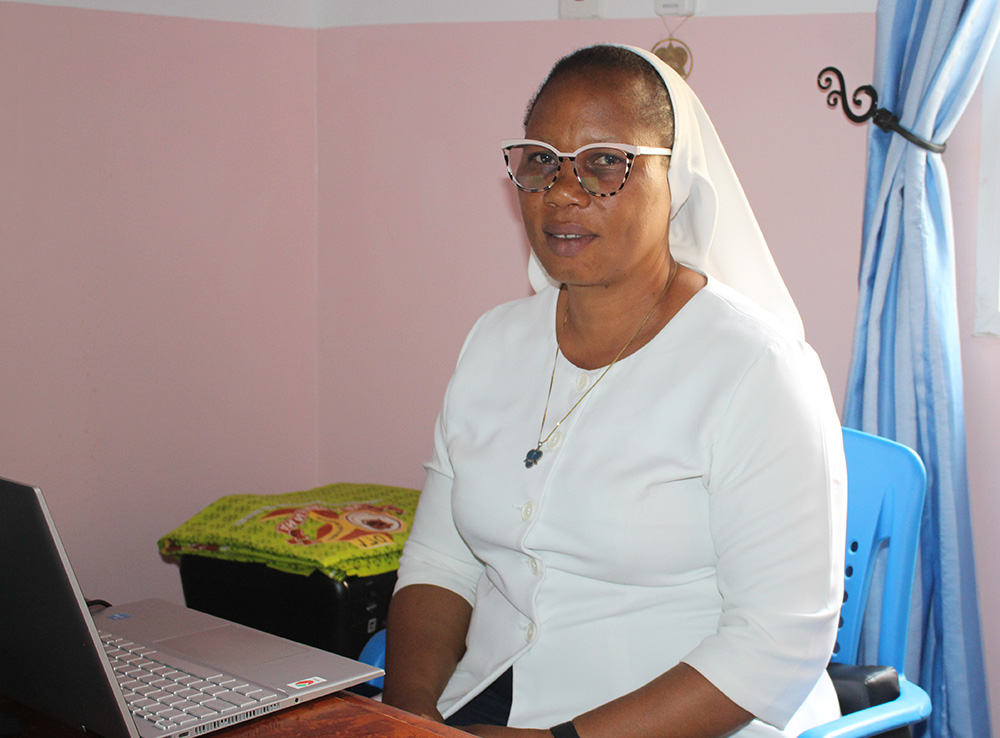
Holy Child Jesus Sr. Assumpta Ndidiamaka Okoli in her office at the Cornelia Maternity and Rural Health Care Centre in Gidan Mangoro, Abuja, Nigeria (Valentine Benjamin)
When Sr. Assumpta Ndidiamaka Okoli was growing up in Amaokpala, a town in Orumba North Local Government Area, Anambra State, southern Nigeria, she had only two things on her mind: to become a medical doctor and a nun. Due to financial constraints, she instead studied accounting, and one of her desires — becoming a nun — was resisted by her mother, her only parent, who wanted her to get married.
Okoli lost her father at the age of 11, and life became difficult. She was born into a polygamous family of 12. She is her mother's first daughter, with only two siblings from her mother's womb.
Okoli, now a sister of the Society of the Holy Child Jesus, was born Dec. 13, 1974, to the late Marcel Okoli and Virginia Okoli in Amaokpala, where she had her elementary education. She then proceeded to high school and obtained her West African Examinations Council certificate in 1995.
She later worked as a teacher and bursar in an elementary school for about four years before proceeding to Federal Polytechnic, Oko in Anambra, where she obtained both National and Higher National Diplomas in accounting in 2004.
Okoli then ventured into entrepreneurship, making cakes, chin chin (a fried Nigerian snack), and doughnuts, a skill borne out of her desire to do catering. But what was most important to her was her yearning to become a nun, which started during her block rosary days.
"As a block rosary member, we often have sisters who come to provide guidance to us, even during Corpus Christi, Christ the King procession and other important events in the church," she told Global Sisters Report. "I always admired their uniqueness, their appearance in veils."
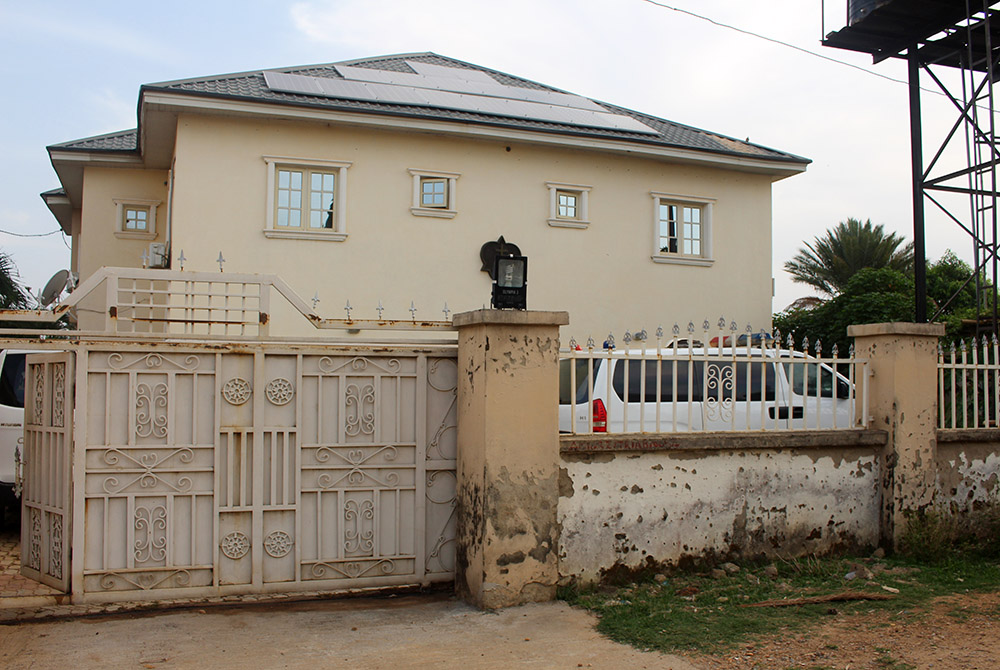
The Society of the Holy Jesus' convent in Nigeria (Valentine Benjamin)
"But when I mentioned this to my mum, she strongly opposed it, being that I am the first daughter of the family and third child."
Her quest of becoming a nun was later made easy after she gave her mother a surprise gift:
My mum gave me 3,000 naira [$6.50] when she was about to travel to Abuja to provide postnatal care to my elder brother's wife, who had given birth to twins. She said the money was for me to build a kitchen for her. Our kitchen at that time was made with palm fronds, which doesn't shield her from rain whenever it's raining.
So, I saved more money from my baking business and contacted bricklayers, who molded blocks and built the kitchen with a storeroom. My sister and I also did some farming work for her before she returned. I didn't know that God wanted to use it to liberate me. My mum returned and was astounded. She knelt down, gave thanks to God and gave her approval of me becoming a nun.
Okoli completed her yearlong postulancy at the Holy Child postulancy in Cape Coast, Ghana, in 2006, after which she had her novitiate for two years and professed vows Sept. 14, 2010, and joined the Society of the Holy Child Jesus.
Okoli sat with GSR to discuss how her congregation's hospital ministry and health programs contribute to the well-being of indigent Nigerians and what motivated her to become a nun.
GSR: The Society of the Holy Child Jesus established Cornelia Connelly Hospital and Cornelian Jubilee Hospital, both in Abuja. What do these hospitals do?
Okoli: These hospitals are managed by Sisters of the Holy Child Jesus and are licensed to provide both primary and secondary health care services for the residents of Gidan Mangoro, Jikwoyi and its environs.
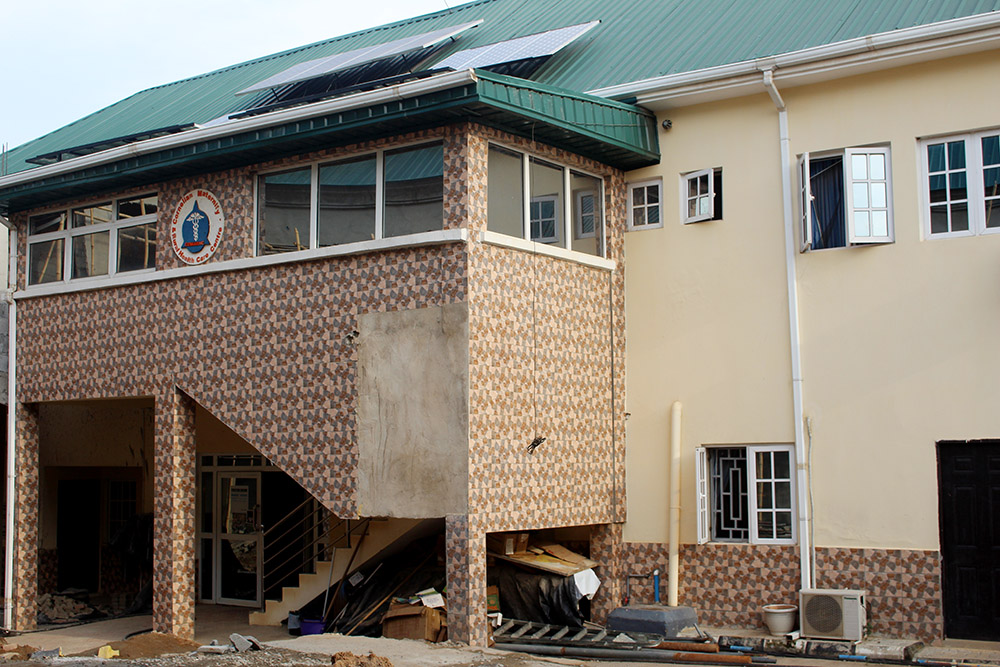
Cornelia Maternity and Rural Health Care Centre in Gidan Mangoro, Abuja, Nigeria. Holy Child Jesus Sr. Assumpta Ndidiamaka Okoli works here with three other sisters. (Valentine Benjamin)
The services we render include medical treatment of various ailments; an antenatal clinic; labor and delivery; immunizations; a postnatal clinic; eye-care services; laboratory services; ultrasound scanning; male circumcision; surgeries; a pediatric clinic; ambulance services; incubator services; free HIV counseling, screening, and treatment; and, most importantly, making Christ known through our evangelization.
How do your hospital ministry and health program contribute to the health and well-being of indigent Nigerians, and how does it emulate Christ and the role of the church?
Christ is the ultimate healer: "By his stripes, we are healed." The role the church plays in health is by bringing inspired people who are professionally trained to attend to the sick. Surgeons and gynecologists are also engaged to carry out major surgeries, pediatrics, optical appointments, hence bridging the gap of health care accessibility to nearby communities.
Why did your congregation start this hospital ministry?
This clinic came to existence through an ugly incident that happened in 2009, when a man rushed to call one of our sisters working at Loyola Jesuit College to say that a woman gave birth in the bush while farming. They thought that any sister is a midwife, but as God may have it, the woman and the baby survived through the quick response of the sister.
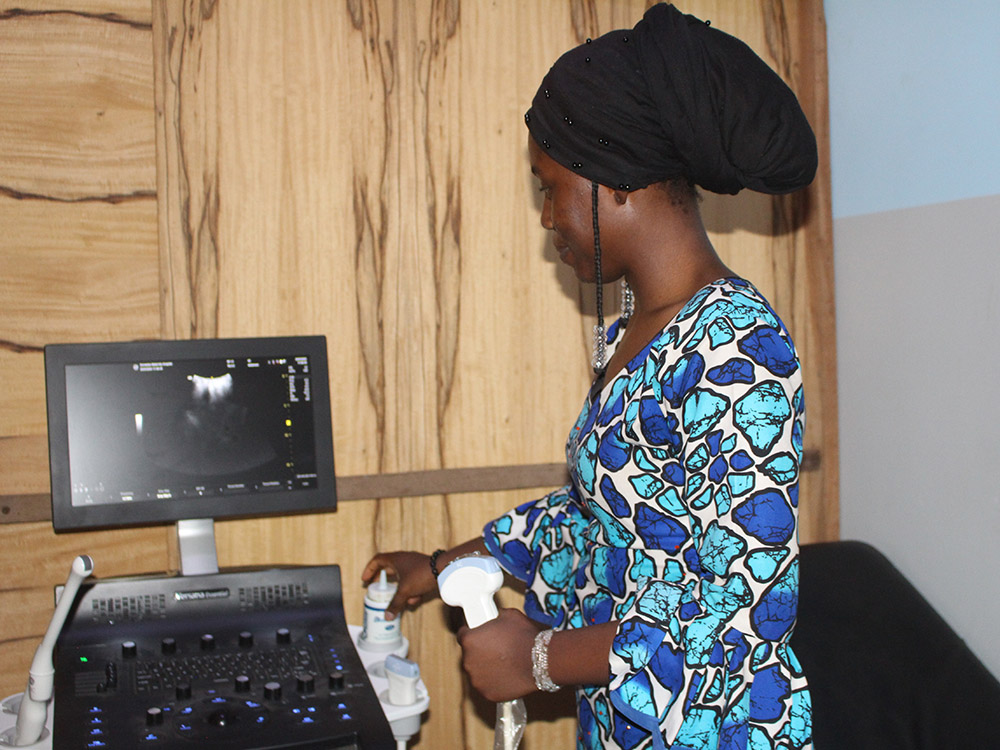
A diagnostic medical sonographer operates the sonography machine at the Cornelia Maternity and Rural Health Care Centre in Gidan Mangoro, Abuja, Nigeria. (Valentine Benjamin)
After that, the Society of the Holy Child Jesus built a small bungalow with the help of the TJ Whalen Memorial Foundation to care for the villagers because there was no hospital then in this area, and they became traditional birth attendants. The clinic has grown to take care of different ailments, including malaria and coughs, to provide immunizations and more.
Maternal, infant and child health consequences of malaria could result in anemia, miscarriage, and low birth weight of the babies, while malaria in children can progress to a severe form that can be accompanied by convulsions, coma, organ failure and neurological abnormalities. What can society, the church and governments do to address this crisis, especially for those in far-to-reach Nigerian communities?
The church and the government can collaborate to carry out health outreach with medical personnel especially for those in far-to-reach Nigerian communities. During this time, malaria tests are carried out and antimalarials given if positive and malaria prophylaxis given to those who test negative for prevention. On-site treatment for certain health conditions can be done outside the hospital.
The community's key decision-makers, like their chiefs, the church and the government, can undergo massive mobilization and health talks to stimulate good behavior changes that favor good health practices. Education of the community on good sanitary measures and use of insecticides and treated nets can help prevent malaria and other infectious diseases.
Encouraging the members of the community to seek hospital care when ill can be emphasized during health talks as well for early detection and treatment. Routine medical checkups can be encouraged to help improve the quality of life of members of the community.
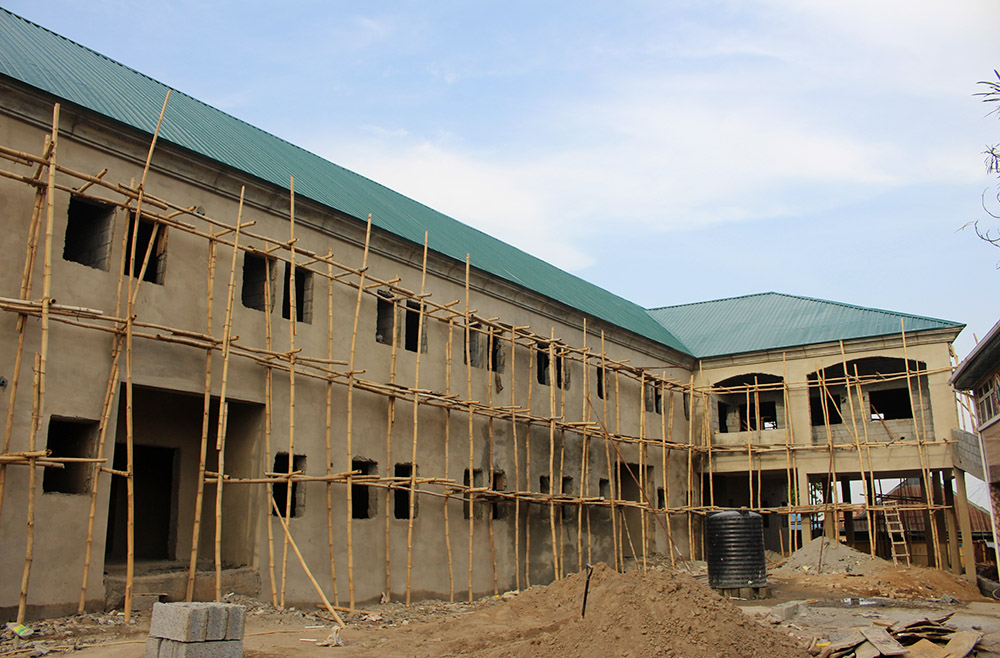
An ongoing construction of a new hospital building financed by staff of the Central Bank of Nigeria (Valentine Benjamin)
If the church and the government can really come together for this program and provide the resources, then this can be done every two months at different communities at different times to reduce the deaths caused by malaria.
In addition to this health ministry, which focuses more on indigent Nigerians, you belong to the Cornelian Hope Alive Support group, which is building the economic capacity of women through skills acquisition to strengthen household economics. How do you do this work, and how does it address the economic needs of poor families, especially those who live below $2 per day?
There are a number of ways in which we assist the members of the community financially, especially the indigent, the poor and needy. Many of these indigent patients cannot afford their hospital bills, so they rely mostly on us for this and for food when they are being admitted to the hospital.
We do this directly and indirectly — for example, through direct financial transfer to cater for their needs. Some well-meaning Nigerians support us to help them financially to start up some business: Some sell tomatoes, secondhand clothes, charcoal, firewood and so on. This act has helped many of them to be independent.
A few days ago, a woman with five children, including a newborn, came in the rain, having trekked a long distance from a neighboring town. She said people told her she will get help from our convent. Sadly, when they arrived, she said that they had not eaten for two days.
Advertisement
We gave them warm food and some tubers of yam to take home, then a monetary gift was transferred to the mother, who wept while she informed me and the other nuns that the man she is not legally married to had abandoned her and the children and had squandered all her money from her sewing business and sold off her machines.
This purpose is served through the purse of Cornelian Hope Alive Support group, encouraging small-scale businesses through seed donations. This purse has been graciously sustained by donations from our friends, the laity and other well-meaning Nigerians.
We celebrate Christmas with this support group every year, offering them some foodstuff. With the skill acquisition we taught them, and having given them some funds through the support of people, they engage themselves with some production of the things they have learned, such as soap and air freshener.
Should the church be involved more in health ministry and pastoral care, and if so, why?
Yes, the church should be involved more in health ministry and pastoral care because the church serves as a refuge to the sick and lonely. The community has a high premium for the nuns and the religious. They put their utmost trust in us. The opportunity to care for the sick will also double up as an opportunity to evangelize and gain more souls for Christ.
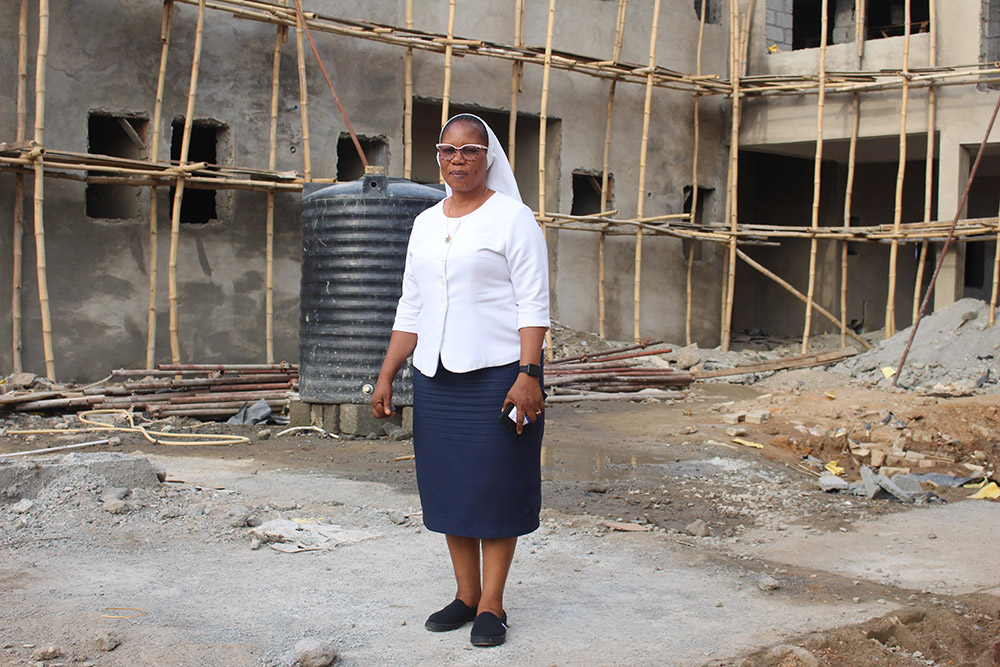
Holy Child Jesus Sr. Assumpta Ndidiamaka Okoli poses for a photo on the site of a new hospital building. (Valentine Benjamin)
What are the major challenges you have faced, and how were you able to get around them?
One of our major challenges working among the poor in Gidan Mangoro is nonpayment or delay in payment of hospital bills by some indigent patients.
We have the practice of attending to the patients brought to the clinic promptly to save their lives first, with hope that the person will pay later. To this practice, some have complied, but others do not have money to pay for their hospital bills. This resulted in the facility having accumulated bills of patients yet to be paid.
To this effect, the clinic opened a subsidiary account to respond to this yearning need and to help clear the outstanding bills.
We approach individuals, groups and corporate bodies to contribute to this noble venture. We received support bit by bit, but the hospital always has so many unpaid bills. Being a small facility without external regular support, it is always a struggle to pay staff salaries, buy all the medications and medical supplies, fuel the generator, carry out maintenance, and other expenses.





